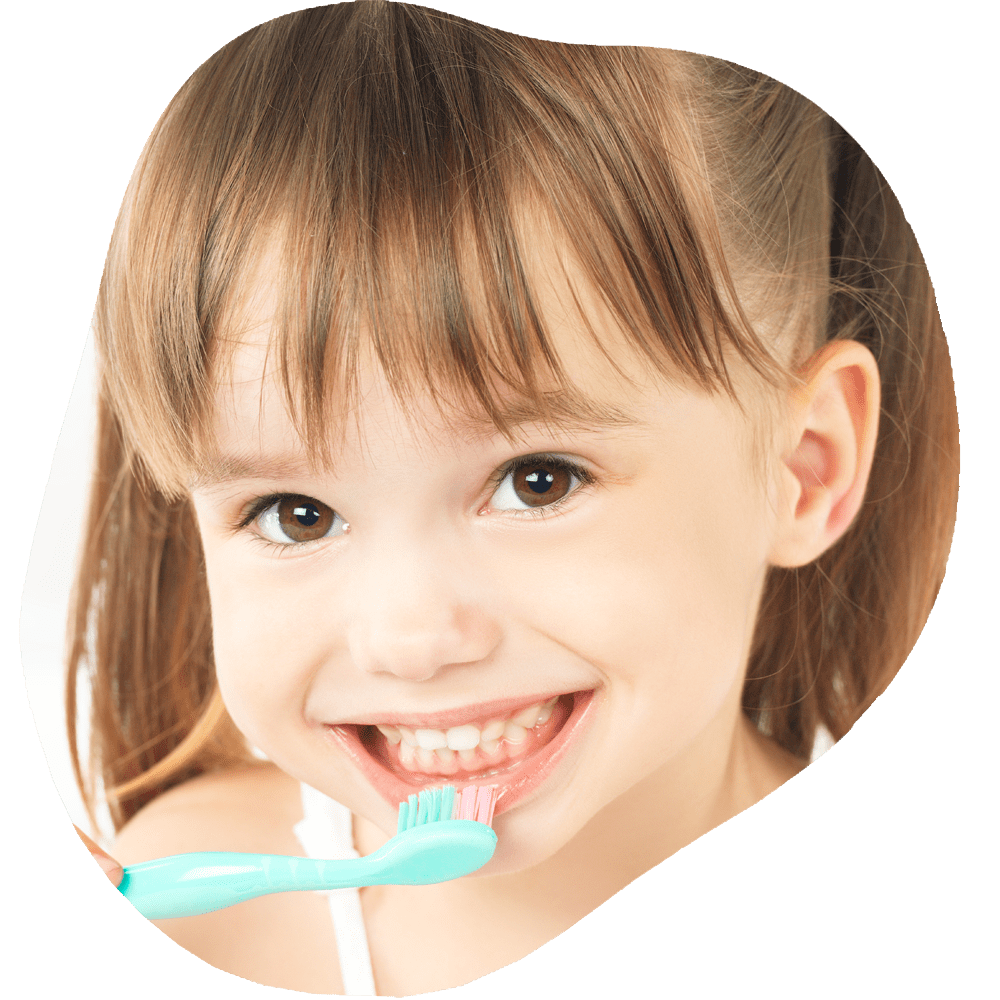Toothville Family Dentistry is pleased to offer Children’s Dentistry to patients of all ages, no matter what age or stage of life. We are proud to offer Children’s Dentistry services tailored to children and their specific needs, from birth all the way to adolescence.
Children’s Dentistry
Your NW Calgary Choice for
Children’s Dentistry!

Start your Child off for a
lifetime of good oral health!
When it comes to Children’s Dentistry, early detection and treatment of any type of dental condition are so important. In fact, the earlier we begin to see your child, the more comfortable he or she will feel when they visit our office. The first dental visit should take place when the first tooth erupts, or around a child’s first birthday, whichever comes first.
We offer Complimentary Dental Appointments
for Children Under the Age of Three!
Toothville Family Dentistry is pleased to offer Children’s Dentistry “Happy Visits” to patients under the age of three. These complimentary general checkups and cleanings are a great way to introduce our youngest patients to the clinic environment, get them used to dental visits, and set them up for a lifetime of good oral health and maintenance.

We look forward to meeting your child in a happy and relaxed atmosphere!
Children’s Dentistry at Toothville Family Dentistry commits to educating you and your child about the importance of:
1. Proper oral hygiene during pregnancy, for you and your developing baby
- What you eat and drink during pregnancy, as well as your oral hygiene, can affect the teeth of your unborn child. It’s important to stay on schedule with your daily dental hygiene routine and dental check-ups during pregnancy. Our dental procedures and techniques pose no threats to your unborn child and you shouldn’t have any concerns about coming in for your routine exam. However, please be sure to mention that you are pregnant when you come in.
- It’s important to have your gums checked for inflammation or infection during your pregnancy. This is because women with periodontal disease are seven times more likely to deliver too early or have a low birth weight baby.
- Ways to Keep Teeth and Gums Healthy During Pregnancy
- Brush twice a day, and floss once daily
- Eat a healthy diet
- Increase your dietary intake of Vitamins A, C and D and foods rich in calcium, protein and phosphorous. Your baby’s teeth begin to develop during the second trimester. Vitamin D deficiencies have been linked to tooth enamel defects in developing teeth, making your child far more susceptible to tooth decay.
- If you experience morning (or night) sickness, flush your mouth out with water.
- Resolve any necessary dental conditions during the 2nd trimester, if possible, to avoid the build up of bacteria and infection. Leave elective procedures until after the birth.
2. Caring for baby teeth - to foster good habits and protect secondary adult teeth
- Baby teeth need just as much attention as adult teeth. To help prevent those first cavities and fillings in baby teeth, it’s important that you understand the dental needs of your child. Even before your baby’s first teeth erupt, you can clean your baby’s gums by rubbing them after each meal with a clean washcloth. Most babies start to teethe at about six months of age or later. Some go through the process with very little discomfort, while others experience pain and increased irritability or fussiness. Cold water-soaked washcloths, a cold teething ring, or rubbing your baby’s gums with a clean finger or an over-the-counter topical anesthetic for temporary pain relief is recommended.
- Symptoms of teething include:
- Increased saliva production with drooling
- Biting on the hand or other hard object
- Decrease in normal appetite
- Increased irritability/crying
- Swollen or tender gums
- We believe that it’s normal for children to suck on their thumb, fingers, or a pacifier, with no harm done up until the age of four or five, when permanent teeth may begin to erupt. Most children will give up the sucking habit by age four. If you are concerned about your child’s sucking habits, please mention this at your visit so we can keep a watchful eye as your child’s teeth continue to develop.
- You should strongly encourage your child to drink from a cup at the age of one year.
- We suggest that you try to wean your baby from a bottle by the age of 14 months. Never allow your child to take a bottle to bed, as any liquid that is in the bottle can cause tooth decay if it remains in the child’s mouth after he/she falls asleep.
3. A child’s first dental visit - we educate and encourage a proper oral hygiene schedule to prevent tooth decay from occurring in the first place
- When you schedule your child’s first visit, we’ll be able to walk you through suggestions we offer to parents of our “first time” patients.
- During your child’s first visit, we will request information about your child’s complete medical and dental history up to that point. We will examine your child’s teeth, demonstrate proper brushing and oral hygiene, and discuss proper care and routine dental maintenance with you. You can also feel free to discuss any concerns you might have. We may also have you or your child hold a mirror as we count their teeth with them. This makes the visit interactive and fun for your child.
4. Addressing tooth decay, even in baby teeth
- The single most effective way to prevent the possibility of early tooth decay in your child is to practice prevention, right from the very start. This means scheduling your child’s first dental visit right around their first birthday, or when their first tooth erupts, whichever comes first.
- Tooth decay is preventable in 90% of all cases, with proper hygiene and regular dental care.
- Children should maintain a Healthy Diet, especially avoiding things like sugar, carbohydrates, gummy snacks, carbonated beverages, fast food and candy. Supply your child with plenty of tooth-healthy snacks, such as fruits, vegetables, crackers, and cheese.
- Never put your baby to bed with a bottle unless it contains water, and wean your child to a cup as close to the first birthday as possible.
- Fluoride is an essential ingredient to help strengthen developing teeth. It also helps to prevent tooth decay in older children. Most tap water is fluoridated, so if your child regularly drinks bottled water, please talk to us about your child’s fluoride needs.
5. Fillings for baby teeth and the need for crowns, if required
- Your child’s primary (baby) teeth are more important than you might think. They help your child to chew food, form good speaking habits and pronunciate words correctly. They also serve as placeholders for permanent teeth and as guides for their eruption. And of equal importance, they provide your child with the positive self esteem that comes from having healthy-looking teeth.
- Primary teeth that become decayed can affect the permanent teeth beneath them. The decay from the baby tooth can spread to the permanent tooth as well. Pulling a tooth, instead of filling it, might affect the way your child chews, or if it is a front tooth, pulling it can affect your child’s speech.
- We believe that it is always best to save a tooth rather than to pull it. When you pull a primary tooth, the other teeth can shift, closing the space that needs to be maintained for the permanent tooth.
- In some instances, a tooth may be so decayed that we have no choice but to pull it. When this happens, we might recommend the insertion of a space maintainer, to protect the space where the tooth was removed, until the permanent tooth is ready to come in.
6. Maintaining the space for a permanent tooth when baby tooth falls out prematurely
- Sometimes, a child’s tooth is so badly decayed that there is no way to save it. When this occurs and the tooth must be pulled, we will insert a space maintainer to reserve the space for the permanent tooth.
- Basically a space maintainer does exactly what its name implies. It holds the space vacated by a pulled tooth for the permanent tooth, so it will erupt in the proper position. When a child loses a tooth prematurely due to severe decay or an accident or injury, we will insert a space maintainer to keep the other teeth from shifting because of the open space and to avoid a crowding issue that could occur if sufficient room is not available for the permanent tooth to erupt.
7. Correcting any tooth that is chipped or broken
- With our younger patients, accidents and injuries that result in chipped or fractured teeth are always a concern, especially if they involve permanent teeth! However, even in primary teeth, we often employ restorative measures to improve your child’s appearance so they can keep their self-esteem intact.
- If your child experiences a chipped or damaged tooth as a result of an accident or injury, call Toothville Family Dentistry immediately to have your child examined. Immediate care can help reduce the possibility of more extensive treatment later on.
8. Special appliances that prevent your child from grinding teeth while they sleep
- If your child suffers from bruxism, or teeth grinding as it’s more commonly called, we’re here to help and to reassure you. Give Toothville Family Dentistry a call today and make an appointment to have your child seen by the dentist to determine whether your child needs certain treatment as a result of grinding their teeth.
9. Preventative orthodontics that can help to minimize the need for more extensive and costly future orthodontic care
- Preventive orthodontics provides dental professionals with a way to identify and intercept teeth problems in children, that when caught early enough, help to avoid more aggressive and costlier treatment later on. As your child grows, certain problems may become apparent during their regular examination at Toothville Family Dentistry. These tooth problems may include, but are not limited to, crowding or too much space between teeth, overbite, underbite, extra teeth, missing teeth, jaw abnormalities, extracted teeth, and protruding teeth.
10. Consulting an orthodontist
When we determine that an Orthodontist is necessary
11. How to have a pain-free, no stress dental experience that will keep your child comfortable and relaxed
- We provide all of our young patients with a pain-free, no-stress dental experience that will keep them coming back. This includes pain management for dental procedures, when necessary, to keep your child comfortable and relaxed.
- Sedation dentistry involves the use of anesthetic agents to keep a patient relaxed, comfortable and unable to feel any pain or discomfort. Most often, we use conscious sedation with children, which allows them to experience a state of very deep relaxation, breathing on their own. They are able to speak or respond to instructions or questions.

Toothville Family Dentistry prides itself on offering child-friendly care for all dental concerns and treatment!
As parents ourselves, we understand the unique needs and concerns that children have when it comes to dental visits, and we are every bit as concerned about your child’s dental health as you are. Teeth are meant to last a lifetime, and we are committed to ensuring that they do, right from the time the first tooth appears all with the help of Children’s Dentistry!




